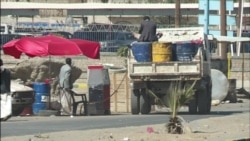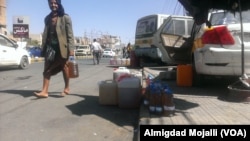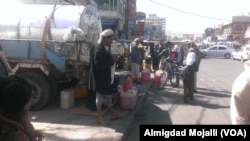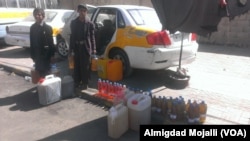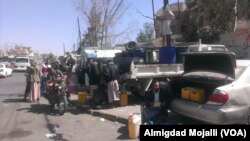Men and boys on the streets of Sana’a, Yemen's largest city, sell fuel for cars and generators out of jerry cans, water bottles and barrels.
The fuel black market is one of the few ways to keep a family afloat during this relentless war, they say.
Meanwhile, airstrikes are only getting worse.
“Yemen is under siege,” shouts Nasser Mohammed Al-Sa'adi, buying fuel for his car in the Yemeni capital. “No oil is coming in by the sea so the prices are soaring.”
Saudi-led coalition airstrikes have intensified in recent days here, and Iran has accused Saudi Arabia of attacking its embassy in Sana’a. Saudi Arabia sees Houthi militants — the target of the attacks — as agents of Iran, a charge Tehran denies.
Long-time rivals Saudi Arabia and Iran severed diplomatic ties this week after the execution of a prominent Shi’ite cleric in Saudi Arabia prompted protesters to attack its embassy in Tehran.
Analysts say the biggest losers in this rivalry are countries like Yemen, embroiled in regional conflicts seen as proxy-wars for Saudi Arabia and Iran, the two most powerful countries in the region. Besides geopolitical and economic competition, the two countries are at the heart of the regional sectarian divide. Saudi Arabia is the main Sunni power; Iran, the strongest Shi’ite country.
“This conflict is manifesting itself all over the Middle East, but especially in Syria, in Yemen and to a lesser extent Iraq,” says Max Abrahms, a member of the Council on Foreign Relations and a professor at Northeastern University. “In all three of those conflicts, the Saudis and Iranians have different positions and are really at loggerheads with each other.”
Black market fuel
As the war drags on with coalition airstrikes now in the 10th month, Yemenis say the economic crisis and mass fuel shortages have become as deadly as the battles.
Black market fuel can cost as much as seven times the subsidized price Yemenis are used to paying, and the consequences are disastrous.
Food prices have gone up, and food production has dropped sharply, says Sadiq al-Qeyari, a Sana’a resident.
“Farmers are only able to plant enough to feed their own families because large equipment requires fuel,” he explained.
More than half a million Yemeni children are already in danger of dying from starvation, according to UNICEF.
Black market fuel is also slowly eroding the equipment and vehicles it powers, further damaging the economy, according to Nabil al-Rada’e, who sells auto-parts.
“We buy fuel at very high prices on the black market,” he said. “The sellers sometimes cheat, add fake materials to the fuel that damages the cars. I see a lot of cars broken because of this.”
Besides the threat of further starving the country and economic decimation, oil officials say people are now dying because of fuel shortages.
“The price of all commodities, including vegetables and other food products has increased,” said Anwar al-Ameri, the spokesman for the Yemen Oil Company. “More and more people are dying because of this, the lack of electricity and the lack of fuel to keep the hospitals operating.”
Politically, the war appears to be a battle between Saudi Arabia, Iran, and other foreign powers, Sana’a residents say. But they point out that while the power players may be locked in battle here - the victims are all Yemeni.




